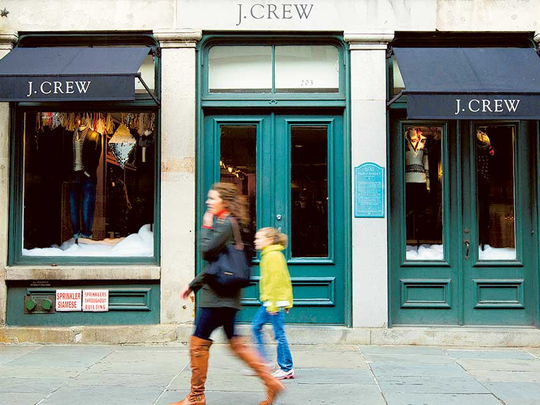
New York
For shoppers, J. Crew and Claire’s are well-known places to pick up preppy clothes or trendy earrings. For creditors of these struggling companies, the real deal is who gets to own the brands.
Lenders count on the drawing power of such instantly recognisable names, the “intellectual property”, to provide some value in case a company goes bust. Otherwise, they’d be stuck with a bunch of nameless stores selling anonymous argyle sweaters and tween bangles.
That’s the concern as retailers such as J. Crew Group Inc. and Claire’s Stores Inc. create subsidiaries to hold brands, trademarks, processes and web domains. These units enable companies to insulate assets from creditors while potentially using them as collateral to back new debts.
With retailers now dominating lists of troubled issuers, lenders and consultants such as Covenant Review are warily speculating about who’ll be next to “pull a J. Crew”.
“When we look at it and say, “Oh boy, they could really get some assets stripped out”, we tend to stay away,” said Jeff Peskind, who oversees a $1.4 billion (Dh5.14 billion) distressed-debt fund as chief investment officer of Phoenix Investment Adviser. “Some of these companies are in such dire financial straits that they’ll do just about anything they can to try to stay alive for another couple months.”
Xtract Research, the New York-based firm that helps investors detect loopholes in debt documents, produced a list of 59 companies with similar “trap doors”. Covenant Review, also in New York, explored nine distressed retailers whose loan documents could allow them to copy J. Crew, which transferred its IP assets into a so-called unrestricted subsidiary in December.
Among the candidates are Neiman Marcus Group, Talbots Inc., Gymboree Corp., Payless Inc. and True Religion Apparel Inc.
So far, no one has presented a legal argument persuasive enough to block the IP manoeuvre, and J. Crew has asked a judge to preemptively affirm the legality. Investors and analysts attribute the uncertainty to loosely drawn covenants.
“With a lot of the retail names, restrictions on intellectual property were practically nonexistent,” said Noel Hebert, director of credit research at Bloomberg Intelligence. “Most of the IP language was drawn up in a way that you can basically do whatever you want with it.”
In some cases, this turns investment decisions upside-down. Peskind said his firm prefers to buy into the junior part of the capital structure at similar retailers, rather than risk getting less security than expected. Investors who hold those senior loans “can wake up to pretty nasty surprises,” he said.
J. Crew and Claire’s are both struggling with debt from leveraged buyouts, and the new entities can ease cash crunches when the IP assets are used as collateral for loans.
Claire’s, owned by New York-based Apollo Global Management, last year set up an unrestricted subsidiary that holds 17.5 per cent of Claire’s US intellectual property. In turn, the unit helped back a $130 million loan and a debt exchange that postponed some maturities. What’s irking some creditors is that the unit’s new debt has priority ahead of existing first-lien bonds at some other subsidiaries.
This allows holders of the new debt — a group that includes Apollo — to move higher in the capital structure, Hebert said.
J. Crew, based in New York and owned by TPG Capital and Leonard Green & Partners LP, invested assets including its brand name in an unrestricted entity that could be used for similar purposes. The retailer then sued the agent for its senior lenders on February 1 to establish the legality, claiming the change didn’t violate its loan agreement.
There’s not much precedent for such movements, and the outcome of J. Crew’s court case could determine how many retailers follow suit, according to Peskind.
The paper-shuffling is part of efforts by retailers to engineer operational turnarounds, and buying extra time can be crucial, said Durc Savini, a senior restructuring banker at Guggenheim Securities who primarily advises distressed companies.
“If an asset is not entirely tied up or pledged under a document, then it should be understood by investors that sophisticated financial sponsors will find a way to take advantage of permitted asset transfers,” Savini said.
Blame for the friction lies not necessarily with the companies, but with the markets for not properly pricing the risk for scenarios where bankruptcy is the alternative, Phoenix’s Peskind said.
“Desperate times call for desperate measures,” he said. “This is a pretty aggressive move by an equity owner, but if you’re staring at a potential filing and a complete wipeout of your investment, yeah, you’ll do it.”
- Washington Post












